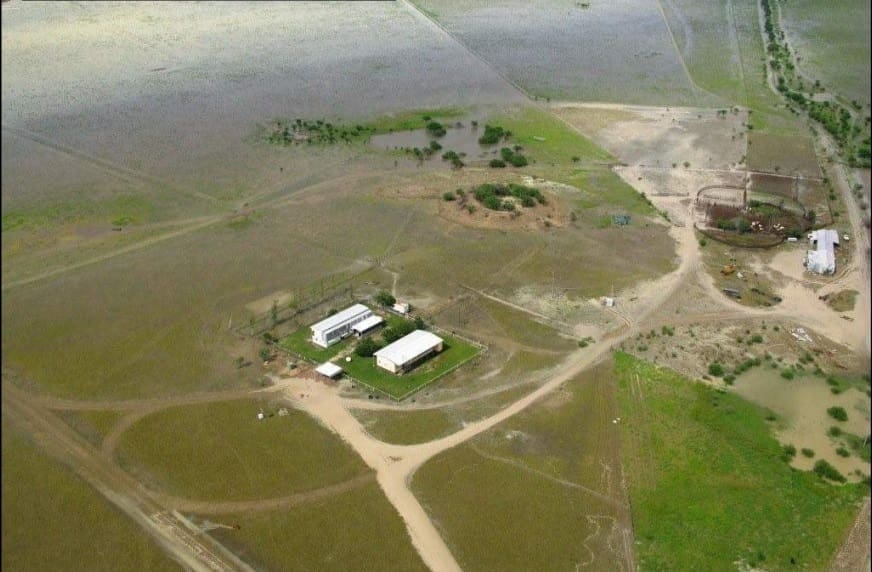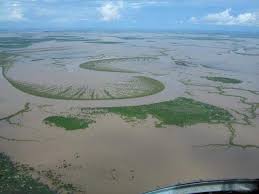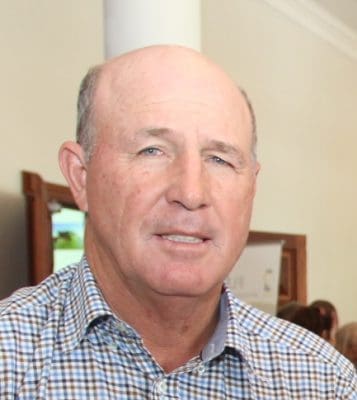
Etta Plains homestead from the air during the 2009 flood
HARNESSING floodwaters for irrigation and dryland farming appears to be a step closer in far north Queensland, with a New South Wales father and son partnering up to bring their farming expertise to the region.
Robin and Luke Findley, from the Narrabri-based Findley family, have paid almost $25 million (land and water licences) for Alister and Joanne McClymont’s large-scale northern breeding and finishing property Etta Plains.
Located 120km north of Julia Creek, Etta Plains is positioned in the fertile, self-cracking clay soils of the Gulf country of north west Queensland, between the Flinders and Cloncurry Rivers.
Spanning 28,442 hectares, the country is flat open grass lands of Flinders and Mitchell grass, black soil.
The business has been available for sale for a number of years, however in July last year, Etta Plains was offered as a unique opportunity to establish a large-scale cropping operation with plenty of viable cropping land for expansion. The present owners acknowledged that they are specialist cattle producers – not farmers or irrigators – and hence decided to offer the property to the market.
The enterprise sits on the Balbirini/Georgina landform which consists of treeless, gently undulating plains containing moderately deep clay soils, making it suitable for flood irrigation, with very little to no clearing costs.

Flinders River in flood
Cracking clays are well suited to irrigation due to their high-water holding capacity, with cropping options including cotton, rice, chickpeas, mung beans, sorghum, maize, wheat, soybeans, guar, aziki beans and fodder.
Of the 28,442ha on Etta Plains, there is 19,500ha of potential cropping land – 9500ha of potential irrigation and 10,000ha of dryland cropping. Water could be harvested (including ability to gravity fill storages) from bothe the Flinders and Cloncurry Rivers.
For the past 22 years, Alister and Joanne McClymont’s AJM Pastoral Co, based at Burleigh Station, Richmond, have been running Etta Plains as a large growing/finishing block for calves from their northern breeding properties.
Harnessing water for farming

Vendor Alister McClymont
Six years ago, the couple began securing water. In the first round of the Queensland Government’s review of the Water Resource Plan, the McClymonts applied for a water allocation and licence and were successfully granted 32,000 megalitres. They then acquired a further 7500 Ml.
Alister McClymont said despite the licences, that amount of water was not enough for Etta Plains to reach its full development potential.
“The Queensland Government has the ability to release larger amounts of water to drive the investment and the growth in farming. Etta has 70 percent water reliability, Cubbie has 30 percent. A massive amount of water goes past the property in a typical year, ending up in the gulf, and virtually nothing is captured.”
“Etta Plains is irrigable and dryland farming is possible on many Gulf operations. I anticipate a move towards farming in the very new future,” Mr McClymont predicted.
Chick pea venture pays off
Earlier this year, drought-stricken New South Wales farmer Michael Dickson partnered with Alister’s brother Malcolm to grow chickpeas on his flood affected country at Nelia in north west Queensland.
Mr McClymont said the success of the 4000 tonne crop proved how expertise in farming can make things happen.
Private agent John Wharton from Wharton & Co, Richmond handled the sale of Etta Plains. He believes the region needs people like the Findleys and the Dicksons who can bring the farming experience and expertise to Queensland’s north west.
“Cattlemen are not farmers. The present process by the state government to drip-feed the cattlemen on the river with water allocations they have no ability to develop is a failure. Without the economy of scale, that a large farming area will bring, nothing will happen.”
Mr Wharton is confident Etta Plains has the ability to drive further growth in the region by creating many jobs and diversifying the local economy.
“The property changed hands at a high value due to its existing water licence/allocation,” he said. The Flinders River catchment, with its excellent self-cracking clay soils, and reliability of water, is driving a strong demand for this country.”
Irrigation potential
The new owner of Etta Plains, Robyn Findley said he and his son Luke were keen to establish an irrigation industry in far north Queensland, but it was too early to discuss details.
“That’s too far down the track. We don’t want to talk about what might happen. We want to spend the next year getting to know the property. It’s all about assessing where the true potential is and dealing with it accordingly.”
Mr Findley said the pair was keen to develop a new industry.
“We are excited to be up here and believe there is a huge irrigation opportunity in this part of the world. We want to harness the Flinders and Cloncurry Rivers and try to irrigate, but if that doesn’t pan out, we still have a beautiful cattle enterprise.”
While the Findleys get a handle on their new acquisition, Alister McClymont will continue to agist and lease some of the country on Etta Plains for his northern cattle operations.
